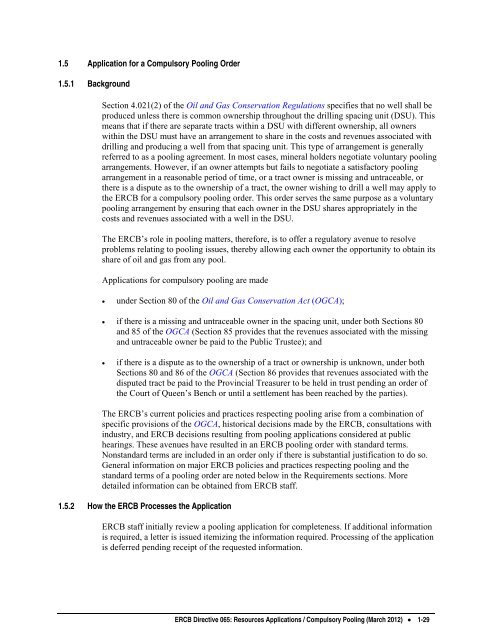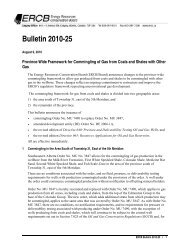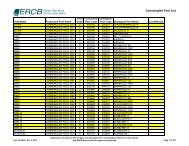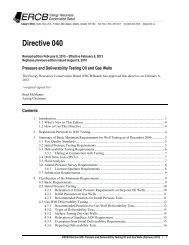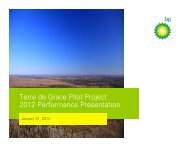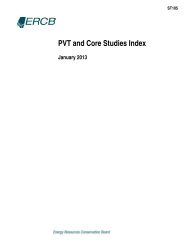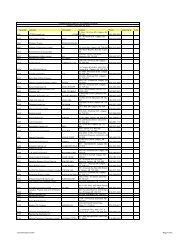Directive 065 - Energy Resources Conservation Board
Directive 065 - Energy Resources Conservation Board
Directive 065 - Energy Resources Conservation Board
Create successful ePaper yourself
Turn your PDF publications into a flip-book with our unique Google optimized e-Paper software.
1.5 Application for a Compulsory Pooling Order<br />
1.5.1 Background<br />
Section 4.021(2) of the Oil and Gas <strong>Conservation</strong> Regulations specifies that no well shall be<br />
produced unless there is common ownership throughout the drilling spacing unit (DSU). This<br />
means that if there are separate tracts within a DSU with different ownership, all owners<br />
within the DSU must have an arrangement to share in the costs and revenues associated with<br />
drilling and producing a well from that spacing unit. This type of arrangement is generally<br />
referred to as a pooling agreement. In most cases, mineral holders negotiate voluntary pooling<br />
arrangements. However, if an owner attempts but fails to negotiate a satisfactory pooling<br />
arrangement in a reasonable period of time, or a tract owner is missing and untraceable, or<br />
there is a dispute as to the ownership of a tract, the owner wishing to drill a well may apply to<br />
the ERCB for a compulsory pooling order. This order serves the same purpose as a voluntary<br />
pooling arrangement by ensuring that each owner in the DSU shares appropriately in the<br />
costs and revenues associated with a well in the DSU.<br />
The ERCB’s role in pooling matters, therefore, is to offer a regulatory avenue to resolve<br />
problems relating to pooling issues, thereby allowing each owner the opportunity to obtain its<br />
share of oil and gas from any pool.<br />
Applications for compulsory pooling are made<br />
• under Section 80 of the Oil and Gas <strong>Conservation</strong> Act (OGCA);<br />
• if there is a missing and untraceable owner in the spacing unit, under both Sections 80<br />
and 85 of the OGCA (Section 85 provides that the revenues associated with the missing<br />
and untraceable owner be paid to the Public Trustee); and<br />
• if there is a dispute as to the ownership of a tract or ownership is unknown, under both<br />
Sections 80 and 86 of the OGCA (Section 86 provides that revenues associated with the<br />
disputed tract be paid to the Provincial Treasurer to be held in trust pending an order of<br />
the Court of Queen’s Bench or until a settlement has been reached by the parties).<br />
The ERCB’s current policies and practices respecting pooling arise from a combination of<br />
specific provisions of the OGCA, historical decisions made by the ERCB, consultations with<br />
industry, and ERCB decisions resulting from pooling applications considered at public<br />
hearings. These avenues have resulted in an ERCB pooling order with standard terms.<br />
Nonstandard terms are included in an order only if there is substantial justification to do so.<br />
General information on major ERCB policies and practices respecting pooling and the<br />
standard terms of a pooling order are noted below in the Requirements sections. More<br />
detailed information can be obtained from ERCB staff.<br />
1.5.2 How the ERCB Processes the Application<br />
ERCB staff initially review a pooling application for completeness. If additional information<br />
is required, a letter is issued itemizing the information required. Processing of the application<br />
is deferred pending receipt of the requested information.<br />
ERCB <strong>Directive</strong> <strong>065</strong>: <strong>Resources</strong> Applications / Compulsory Pooling (March 2012) • 1-29


